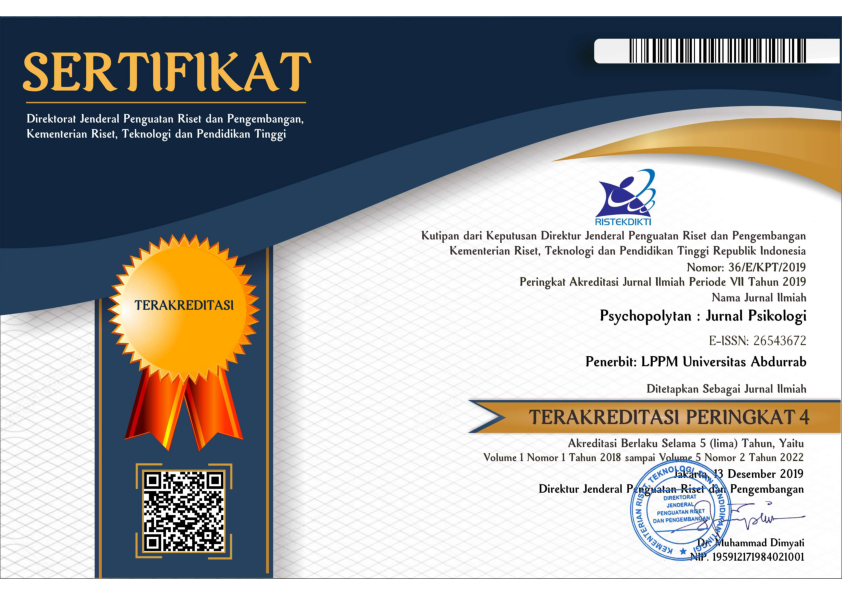Efektivitas Penggunaan Strategi Regulasi Emosi Ditinjau Dari Perbedaan Gender
Sebuah Tinjauan Literatur Sistematis
Abstract
Eksistensi manusia sebagai makhluk sosial tidak terlepas dari perasaan dan emosi yang tidak menyenangkan, sehingga dibutuhkan upaya dalam meregulasi emosi untuk mengubah pengalaman emosional tersebut. Studi ini bertujuan untuk meninjau hasil-hasil penelitian yang mengkaji efektivitas strategi regulasi emosi cognitive reappraisal dan expressive suppression dari perbedaan gender. Adapun metode dalam peninjauan jurnal ini menggunakan database jurnal dari ScienceDirect, ProQuest dan Google Scholar yang terbit dalam 5 (lima) tahun terakhir atau berkisar antara 2017 hingga 2022. Jurnal tersebut didapatkan dengan kata kunci ““Gender Differences”, “Cognitive Reappraisal”, “Expressive Suppression” dan “Emotion Regulation”, dalam kolom pencarian, kata kunci digabungkan dengan menggunakan kata “AND”. Jurnal yang digunakan dalam tinjauan literatur ini berjumlah 7 (tujuh) jurnal. Hasil-hasil dalam tinjauan literatur ini banyak yang menunjukkan adanya perbedaan efektivitas dan penggunaan strategi regulasi emosi antara laki-laki dan perempuan. Hasil tinjauan literatur ini diharapkan dapat memberikan pemahaman dan referensi untuk mengembangkan diagnostik dan intervensi klinis yang lebih tepat.
References
Berke, D. S., Reidy, D. E., Gentile, B., & Zeichner, A. (2019). Masculine Discrepancy Stress, Emotion-Regulation Difficulties, and Intimate Partner Violence. Journal of Interpersonal Violence, 34(6), 1163–1182. https://doi.org/10.1177/0886260516650967
Dryman, M. T., & Heimberg, R. G. (2018). Emotion regulation in social anxiety and depression: a systematic review of expressive suppression and cognitive reappraisal. In Clinical Psychology Review (Vol. 65, pp. 17–42). Elsevier Inc. https://doi.org/10.1016/j.cpr.2018.07.004
Faiz, A., Yandri, H., Kadafi, A., Mulyani, R. R., Nofrita, N., & Juliawati, D. (2019). Pendekatan Tazkiyatun An-Nafs untuk membantu mengurangi emosi negatif klien. Counsellia: Jurnal Bimbingan Dan Konseling, 9(1), 65. https://doi.org/10.25273/counsellia.v9i1.4300
Fatima, S., & Shahid, Z. (2020). Conditional indirect relations between executive functions, emotion regulation, and Machiavellianism in young men and women. Personality and Individual Differences, 165. https://doi.org/10.1016/j.paid.2020.110140
Gross, J. J. (2015). Emotion Regulation: Current Status and Future Prospects. Psychological Inquiry, 26(1), 1–26. https://doi.org/10.1080/1047840X.2014.940781
Gross, J. J., & Jazaieri, H. (2014). Emotion, emotion regulation, and psychopathology: an affective science perspective. Clinical Psychological Science, 2(4), 387–401. https://doi.org/10.1177/2167702614536164
Gross, J. J., & John, O. P. (2003). ERQ. Neurolmage, 48(10), 9–9.
Harley, J. M., Pekrun, R., Taxer, J. L., & Gross, J. J. (2019). Emotion Regulation in Achievement Situations: An Integrated Model. Educational Psychologist, 54(2), 106–126. https://doi.org/10.1080/00461520.2019.1587297
Hasmarlin, H. (n.d.). Self-Compassion dan Regulasi Emosi pada Remaja Self-Compassion and Emotion Regulation In Adolescence. https://doi.org/10.24014/jp.v14i2.7740
Hidayat, D. (n.d.). Social and Cultural Identity Pendekatan Face Negotation Theory dan Public Relations Multikulturalism Negara Jerman-China dan Indonesia.
Jiang, X., Moreno, J., & Ng, Z. (2022). Examining the interplay of emotion regulation strategies, social stress, and gender in predicting life satisfaction of emerging adults. Personality and Individual Differences, 185. https://doi.org/10.1016/j.paid.2021.111255
Khan, A. J., Maguen, S., Straus, L. D., Nelyan, T. C., Gross, J. J., & Cohen, B. E. (2021). Expressive suppression and cognitive reappraisal in veterans with PTSD: Results from the mind your heart study. Journal of Affective Disorders, 283, 278–284. https://doi.org/10.1016/j.jad.2021.02.015
Kobylińska, D., & Kusev, P. (2019). Flexible emotion regulation: How situational demands and individual differences influence the effectiveness of regulatory strategies. In Frontiers in Psychology (Vol. 10, Issue FEB). Frontiers Media S.A. https://doi.org/10.3389/fpsyg.2019.00072
Kwon, H., Yoon, K. L., Joormann, J., & Kwon, J. H. (2013). Cultural and gender differences in emotion regulation: Relation to depression. Cognition and Emotion, 27(5), 769–782. https://doi.org/10.1080/02699931.2013.792244
Lopez-Zafra, E., & Gartzia, L. (2014). Perceptions of Gender Differences in Self-Report Measures of Emotional Intelligence. Sex Roles, 70(11), 479–495. https://doi.org/10.1007/s11199-014-0368-6
Ma, M., Chen, X., Lin, Y., Zhang, B., & Bi, Y. (2022). How does belief in a just world correlate with conduct problems in adolescents? The intervening roles of security, cognitive reappraisal and gender. Children and Youth Services Review, 137. https://doi.org/10.1016/j.childyouth.2022.106432
Megías-Robles, A., Gutiérrez-Cobo, M. J., Gómez-Leal, R., Cabello, R., Gross, J. J., & Fernández-Berrocal, P. (2019). Emotionally intelligent people reappraise rather than suppress their emotions. PLoS ONE, 14(8). https://doi.org/10.1371/journal.pone.0220688
Moltrecht, B., Deighton, J., Patalay, P., & Edbrooke-Childs, J. (2021). Effectiveness of current psychological interventions to improve emotion regulation in youth: a meta-analysis. In European Child and Adolescent Psychiatry (Vol. 30, Issue 6, pp. 829–848). Springer Science and Business Media Deutschland GmbH. https://doi.org/10.1007/s00787-020-01498-4
Nowlan, J. S., Wuthrich, V. M., & Rapee, R. M. (2016). The impact of positive reappraisal on positive (and negative) emotion among older adults. International Psychogeriatrics, 28(4), 681–693. https://doi.org/10.1017/S1041610215002057
Ratnasari, S., & Suleeman, J. (2017). Perbedaan Regulasi Emosi Perempuan dan Laki-Laki di Perguruan Tinggi. Jurnal Psikologi Sosial, 15(1). https://doi.org/10.7454/jps.2017.4
Salimzadeh, R., Hall, N. C., & Saroyan, A. (2020). Stress, emotion regulation, and well-being among canadian faculty members in research-intensive universities. Social Sciences, 9(12), 1–37. https://doi.org/10.3390/socsci9120227
Schneider, T. R., Lyons, J. B., & Khazon, S. (2013). Emotional intelligence and resilience. Personality and Individual Differences, 55(8), 909–914. https://doi.org/10.1016/j.paid.2013.07.460
Shu, J., Ochsner, K. N., & Phelps, E. A. (n.d.). INTOLERANCE OF UNCERTAINTY AND EMOTION REGULATION 1 The Impact of Intolerance of Uncertainty on Reappraisal and Suppression.
Song, X., Fu, W., Liu, X., Luo, Z., Wang, R., Zhou, N., Yan, S., & Lv, C. (2020). Mental health status of medical staff in emergency departments during the Coronavirus disease 2019 epidemic in China. Brain, Behavior, and Immunity, 88, 60–65. https://doi.org/10.1016/j.bbi.2020.06.002
Tamir, M. (2016). Why Do People Regulate Their Emotions? A Taxonomy of Motives in Emotion Regulation. Personality and Social Psychology Review, 20(3), 199–222. https://doi.org/10.1177/1088868315586325
Tang, Y., & Huang, Y. (2019). Contextual factors influence the selection of specific and broad types of emotion regulation strategies. British Journal of Social Psychology, 58(4), 1008–1033. https://doi.org/10.1111/bjso.12313
Torrence, B. S., & Connelly, S. (2019). Emotion regulation tendencies and leadership performance: An examination of cognitive and behavioral regulation strategies. Frontiers in Psychology, 10(JULY). https://doi.org/10.3389/fpsyg.2019.01486
Wang, C., Zhang, Z., Wiley, J. A., Fu, T., & Yan, J. (2022). Gender differences in pleasure: the mediating roles of cognitive flexibility and emotional expressivity. BMC Psychiatry, 22(1). https://doi.org/10.1186/s12888-022-03945-9
Yeh, K. H., Bedford, O., Wu, C. W., Wang, S. Y., & Yen, N. S. (2017). Suppression benefits boys in Taiwan: The relation between gender, emotional regulation strategy, and mental health. Frontiers in Psychology, 8(FEB). https://doi.org/10.3389/fpsyg.2017.00135
Yusainy, C., Nurwanti, R., Dharmawan, I. R. J., Andari, R., Mahmudah, M. U., Tiyas, R. R., Husnaini, B. H. M., & Anggono, C. O. (2019). MINDFULNESS SEBAGAI STRATEGI REGULASI EMOSI. Jurnal Psikologi, 17(2), 174. https://doi.org/10.14710/jp.17.2.174-188
Zhang, L., Lu, J., Li, B., Wang, X., & Shangguan, C. (2020). Gender differences in the mediating effects of emotion-regulation strategies: Forgiveness and depression among adolescents. Personality and Individual Differences, 163. https://doi.org/10.1016/j.paid.2020.110094
Copyright (c) 2023 Psychopolytan : Jurnal Psikologi

This work is licensed under a Creative Commons Attribution-NonCommercial-ShareAlike 4.0 International License.
1. Copyright of all journal manuscripts is held by the Psychopolytan : Jurnal Psikologi
2. Formal legal provisions to access digital articles of electronic journal are subject to the provision of the Creative Commons Attribution-ShareAlike license (CC BY-NC-SA), which means that Psychopolytan : Jurnal Psikologi is rightful to keep, transfer media/format, manage in the form of databases, maintain, and publish articles.
3. Published manuscripts both printed and electronic are open access for educational, research, and library purposes. Additionally, the editorial board is not responsible for any violations of copyright law.
licensed under a Creative Commons Attribution-ShareAlike 4.0 International License.
 pdf
pdf
 Abstract views: 790
Abstract views: 790
 downloads: 742
downloads: 742

 :
:







